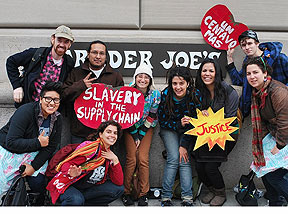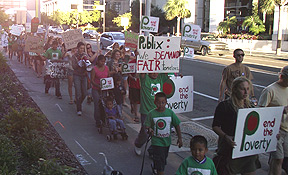In the wake of recent agreements, the Campaign for Fair Food is heating up, with Quiznos on the clock in Denver (right), supermarket protests across the country, a must-read op/ed on the recent agreements from the St. Petersburg Times, and a very nice surprise out of Nashville!
While the CIW has been busy taking care of business in Immokalee (reaching game-changing agreements with tomato industry leaders Pacific Tomato Growers and Six L’s), Fair Food allies across the country have been quite busy themselves, organizing protests at Quiznos, Publix, and Trader Joe’s stores from Oakland to New York City.
Buoyed by the victories in Immokalee, Fair Food allies are taking to the streets with renewed energy and an unassailable message, captured in the words of this sign at the big Quiznos protest in Denver:
“Quiznos: The world is changing. When will you?”
Outside Quiznos corporate headquarters, the fine folks with Denver Fair Food report that they organized, “a rowdy crowd – including not only a broad spectrum from clergy to students of the Denver community, but also our Fair Food companer@s from around Colorado, Kansas, New Mexico, Illinois and as far away as New York and Florida.” Together, they staged a protest that marked the beginning of a campaign of escalating pressure demanding that the sandwich chain “quit stalling” and join the growing movement for Fair Food. As they write in their web report:
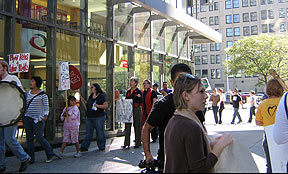 “… The vision of a more just and humane agricultural system is teetering on the edge of becoming a reality. As a major buyer of tomatoes, Quzinos’ purchasing power can contribute to pushing this reality into being or can serve to hold it back, delaying the hopes of thousands of farmworkers. With Pacific – in addition to the other leading Florida grower East Coast, two of the largest organic tomato producers, all Quiznos’ leading fast food competitors, and the food service industry – now solidly behind the CIW’s plan of action, there can be no acceptable excuses for Quiznos’ failure to join the emerging Fair Food consensus. Justice delayed is justice denied, and unless Quiznos works with the CIW, it is supporting the intolerable status quo which is the human rights crisis in Florida agriculture.” read more “… The vision of a more just and humane agricultural system is teetering on the edge of becoming a reality. As a major buyer of tomatoes, Quzinos’ purchasing power can contribute to pushing this reality into being or can serve to hold it back, delaying the hopes of thousands of farmworkers. With Pacific – in addition to the other leading Florida grower East Coast, two of the largest organic tomato producers, all Quiznos’ leading fast food competitors, and the food service industry – now solidly behind the CIW’s plan of action, there can be no acceptable excuses for Quiznos’ failure to join the emerging Fair Food consensus. Justice delayed is justice denied, and unless Quiznos works with the CIW, it is supporting the intolerable status quo which is the human rights crisis in Florida agriculture.” read more |
You can read more about the protest at Quiznos headquarters in Denver here and here.
Meanwhile, in Oakland, Tampa, New York, and Gainesville (FL), Supermarket Campaign protesters made their voices heard at local Publix and Trader Joe stores. Here are some pics sent in from the actions:
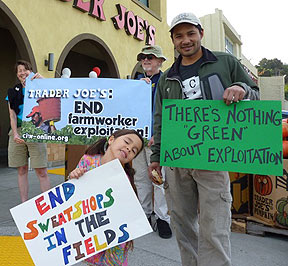 Oakland |
|
|
|
|
The Tampa action (bottom right, above), was a particularly impressive 2-mile march through downtown Tampa that caught the attention of the local media. You can check out the media reports on the march here and here.
Also in the news, Bill Maxwell, the widely-respected columnist for the St. Petersburg Times and long-time observer of the Campaign for Fair Food, wrote a remarkably powerful op/ed on the recent agreement with Pacific Tomato Growers that juxtaposes the new accord with the not so distant past in Florida farm labor history (“Everyone benefits when farmworkers are treated fairly,” 10/24/1). Against that backdrop of abject poverty and degradation, the magnitude of the change contained in the CIW’s Fair Food agreements is unmistakable.
The piece is made ever more poignant by the fact that the history recounted in the article is Bill Maxwell’s own experience growing up as a farmworker in Florida’s fields and spending his childhood in labor camps around the state, including one just 6 miles south of Immokalee. Here’s an extended excerpt:
 “… Many of today’s consumers have no knowledge of yesterday and, therefore, have no historical perspective as to why our produce always has been some of the freshest and least expensive in the world. “… Many of today’s consumers have no knowledge of yesterday and, therefore, have no historical perspective as to why our produce always has been some of the freshest and least expensive in the world.
The harsh truth is that America’s bounty always has been planted, tended and harvested by abused minorities who have remained, and still remain, mostly invisible and powerless. As I watch the CIW’s efforts, I recall my childhood, when I often worked alongside my father in these same Collier County fields. In those days and before, Florida farmworkers were predominantly black. Hardly any Mexican or other Hispanic workers could be found east of the Mississippi. My father and I lived with about 80 other pickers in a camp about 6 miles south of Immokalee. Conditions in the camp, like those in others from Belle Glade to Long Island, N. Y., were filthy and violent. Our living quarters were a tin-roofed, wooden, windowless bull pen where 10 to 15 men and boys slept on pallets. Families with children and single women slept in shacks across the compound from the men… … Hard work — stooping, sweating and lifting all day — was at the center of our lives. We literally were the property of the crew chief and the grower. We rode from field to field on the beds of trucks and in old school buses that regularly broke down… … In light of history, Pacific Tomato Growers’ pact with the CIW is a giant step toward bringing justice to the fields. The hope now is that other companies and organizations, such as Publix and the Florida Tomato Growers Exchange, do the right thing. Everyone benefits when farmworkers are treated fairly. read more |
Do yourself a favor and take five minutes to read this very necessary piece. It is a rare and precious occasion when reporting on this campaign is informed with such raw and personal experience.
Finally, in Nashville, Tennessee, some one thousand miles from Immokalee, the Metropolitan Council of Nashville and Davidson County passed a resolution “recognizing and welcoming the Coalition of Immokalee Workers Modern-Day Slavery Museum and their efforts to bring to light the continued struggle against slavery.” Here’s an excerpt:
| “WHEREAS, Nashville’s movement for civil rights was a crucial spark in ending segregation throughout the South, part of a nationwide movement for self-determination by oppressed minorities in the United States; and…
… WHEREAS, despite the successes of the civil rights movement, coercion of workers and minorities remains a daunting problem that we are called to address; and… … WHEREAS, the Coalition of Immokalee Workers has gained tremendous industry and popular support around the country for fair food; and WHEREAS, Nashville has historically been a catalyst for racial justice movements, and has a rich history of joining in struggles to ensure justice for all; and WHEREAS it is fitting and proper that the Metropolitan Council recognize and welcome the Coalition of Immokalee Workers’ Modern-Day Slavery Museum and their efforts to bring light to the continued struggle against slavery…” read more |
Makes you want to move to Nashville!
As this update makes clear, these are some exciting days in the Campaign for Fair Food. Change is underway, there can be no doubt. With growing support for Fair Food principles among leading tomato growers, the rate, breadth, and depth of that change depend now more than ever on the buyers of Florida produce — from Quiznos to Publix, Trader Joe’s to Ahold, Kroger, and WalMart.
You can do your part to help speed the day when all of Florida’s farmworkers enjoy the fair wages, respect and dignity they deserve by taking action today. Click here to see how you can let the supermarket giants know that now is the time for Fair Food!

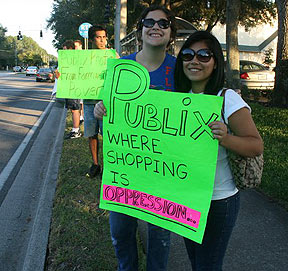 Gainesville, FL
Gainesville, FL 